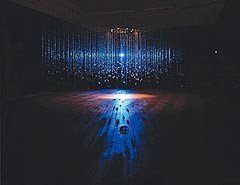Susan Hiller
dal 8/5/2008 al 16/8/2008
Segnalato da
8/5/2008
Susan Hiller
Bawag Foundation (old location), Wien
Outlaw Cowgirl and other Works. This work - a sharp-witted and literate commentary on Freud's amazing collection of art and antiquities, his library, and his house in London - consists of a series of archeological conservation boxes in a vitrine. The show also presents the audio installation Witness (2000), a multilingual collection of reports about people and their encounters with UFOs.

Outlaw Cowgirl and other works displays a comprehensive selection of Susan Hiller’s works from the past ten years, including From the Freud Museum (1991–96). This work – a sharp-witted and literate commentary on Freud’s amazing collection of art and antiquities, his library, and his house in London – consists of a series of archeological conservation boxes in a vitrine. Walking past it, visitors will set out on a personal journey that will disclose the secrets of each box. The show also presents the audio installation Witness (2000), a multilingual collection of reports about people and their encounters with UFOs. In J. Street Project (2002–2005) we can see German streets and squares whose signs testify to the former presence of Jews. With 303 photographs and a film, Hiller has produced an impressive meditation on a word and a bitter period in German history.
Susan Hiller ranks among the most fascinating and influential women artists of our time. Her work has had a profound impact, particularly on the younger generation of British artists. However, Susan Hiller has also exercised a considerable influence internationally. In recent years her works were shown at the Moderna Museet in Stockholm (2007), at the Castello di Rivoli in Turin (2006), at the Kunsthalle Basel (2005), at the Baltic Centre in Gateshead (2004), and at the Museo Serralves in Porto (2004).
Her ambitious art revolves around language, gender, desire, and death and draws from various sources: dreams (Dream Mapping, 1974), Punch and Judy shows (An Entertainment, 1990), historical documents (From the Freud Museum, 1991–96), horror films (Wild Talents, 1997), UFO encounters (Witness, 2000), and accounts about near-death experiences (Clinic, 2004).
Born in Florida in 1940, she studied art and anthropology in the United States. In 1969, she moved to England, where she still lives and works. She developed her approach in the early 1970s as an antithesis to Conceptual and Minimal Art, but in accordance with the feminist ideas of those days. It was then that she familiarized herself with innovative artistic methods. She created collective works involving specific groups of people and realized projects based on ideas hitherto reserved for anthropology. Susan Hiller uses all sorts of media for her work, ranging from performance, installation, and sculpture to sound and video.
Her projects are described as “introspections of the cultural subconscious.” Hiller questions prevalent categories and our civilization’s contradictions between the rational and irrational, between empiricism and intuitive perception, and between dream and everyday life.
The exhibition will be accompanied by a catalog.
Bawag Foundation
Tuchlauben 7a - Wien



